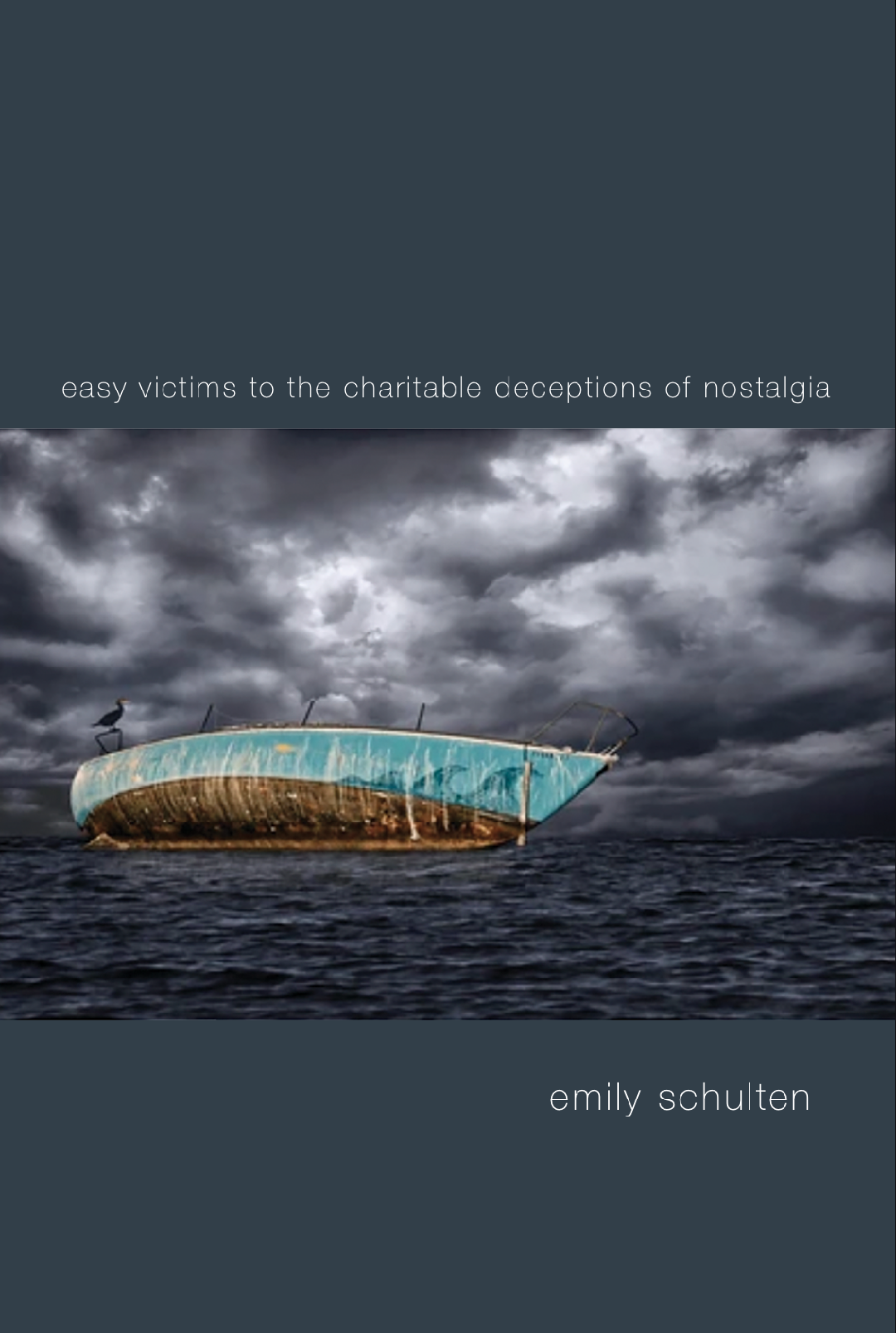Easy Victims to the Charitable Deceptions of Nostalgia
“You can feel the ocean surf eating away the shores of Emily Schulten’s over-traversed island. “When space and silence [once] existed …” The land is being swallowed not only by the tide but by the ever-increasing waves of tourists, by big money, and by a distorted historical narrative. Earnest and hard-won, Emily Schulten’s Easy Victims to the Charitable Deceptions of Nostalgia traverses the few spaces still unpopulated to find the semblance of an affirmation of self. Only (this) much is remaindered in the memory—much of which, itself, is to be questioned. Memory and history have become a blur: “This is how a place becomes a postcard … a folklore of half-truths.” There is loneliness, longing, love, and an attempt to find the self within this last dot of land in an ever-expanding ocean. Is memory simply the residue of embellished folklore? And which of these are other versions of the poet herself? “[Even] the word moves on the page / so that content never remains the same.” Desperately heart-felt, brave, a worthy companion on any island.”
— Marc Vincenz
“Humans are creatures of love and invention, yes, but alongside these lifelines is the constancy of death’s own quickening, the paradox of death’s life that attends everything birthed or handmade: the coral reef, the bride’s twined flowers, the dream, the lush island, the “sea-forest.” This is Emily Schulten’s intricate wisdom as it funnels astonishingly into ecological poems of both earth and heart, teaching us that love, after all, is an earthy, threatened, and majestic thing.”
— Katie Ford, author of If You Have to Go
“So many wonderful poems here! My favorites are the ones about the intimacies of marriage and its alluring mysteries. In one, a woman listens to her husband saying things in his sleep that seem to belong to another lifetime. In another, a couple planning a honeymoon consider Las Vegas with its promise of both fortune and ruin, and in a third, two soon-to-be-marrieds break into an abandoned prison and there ponder what they’re getting into. A perfect blend of smarts and whimsy is at work in these poems, so don’t be surprised if you find yourself saying, “that’s my beloved there” and “oh, that’s me.”
— David Kirby
“Lesson in Vocabulary: Faith” Broadside – 2024 Ralph Angel Poetry Prize Winner
This is a limited-edition broadside of Emily Schulten’s “Lesson in Vocabulary: Faith,” selected by guest judge Richard Jackson’s selection for the 2024 Ralph Angel Poetry Prize and designed by resident artist Talia Ryan.
The Way a Wound Becomes a Scar
“The Way a Wound Becomes a Scar is a stunning volume of poems, truly a book of the body, both literally and metaphorically, that beautifully blends concision and stylistic grace. Especially moving is its swift, precise narrative, articulated with enormous lyric depth, of a kidney transplant from sister to brother. I have no trouble ranking Emily Schulten among our most promising younger poets.”
— B.H. Fairchild
“To read The Way a Wound Becomes a Scar is to enter a world of deep pain and deep beauty, and to exit with a renewed faith in the regenerative power of story, memory, and myth. In this extraordinary collection, Emily Schulten moves beyond the story of a life-saving kidney transplant to probe the edges of familial and romantic love and the connections that bind us all. With images as precise as a scalpel’s blade, these captivating, necessary poems will linger in the body and mind long after the book is closed.”
— Chelsea Rathburn, author of Still Life with Mother and Knife
“These are poems of sacrifice and love, of learning how to live in the real world. They offer no easy answers. Emily Schulten is young and energetic and talented. She will leave her mark on American poetry.”
— David Bottoms
Rest in Black Haw
“A remarkable work—poems that set roots, that wind downward into the earth of a specific place with startling exactitudes—clay thick mud, fever air—poems wrought with great care, full of invisible eyes that open to glimmers of phosphor. This entire book, in its radiance and ashes, is an offering toward the deep.”
— Marsha de la O
“Whether she is writing about some lost and in-love fellow, trapped in the wrong end of a relationship like a bug at the bottom of a mayonnaise jar, or about the Ohio Sweet Corn Festival, there is a strange surety and beauty here that jumps right off the page and pulls the reader in.”
— Leon Stokesbury
“Emily Schulten’s words are chosen with all of the pleasures combined sound and sense provide. Rest in Black Haw is all about our hearts in search of their contentments.”
— Dara Wier






